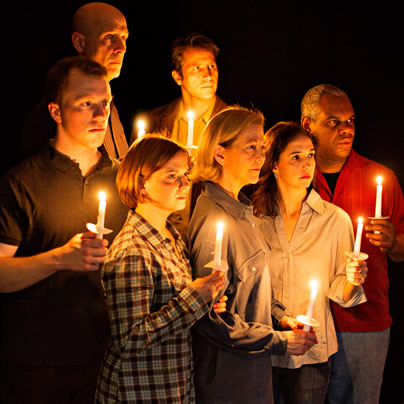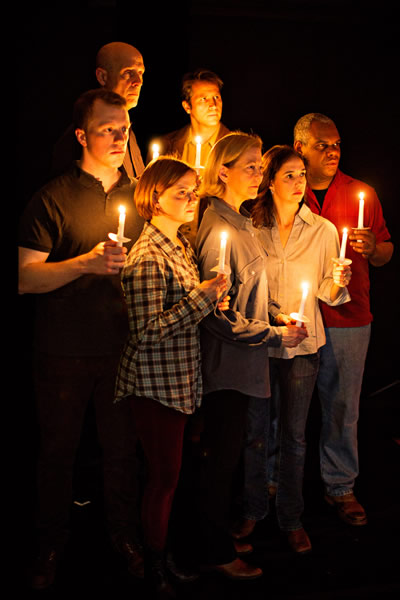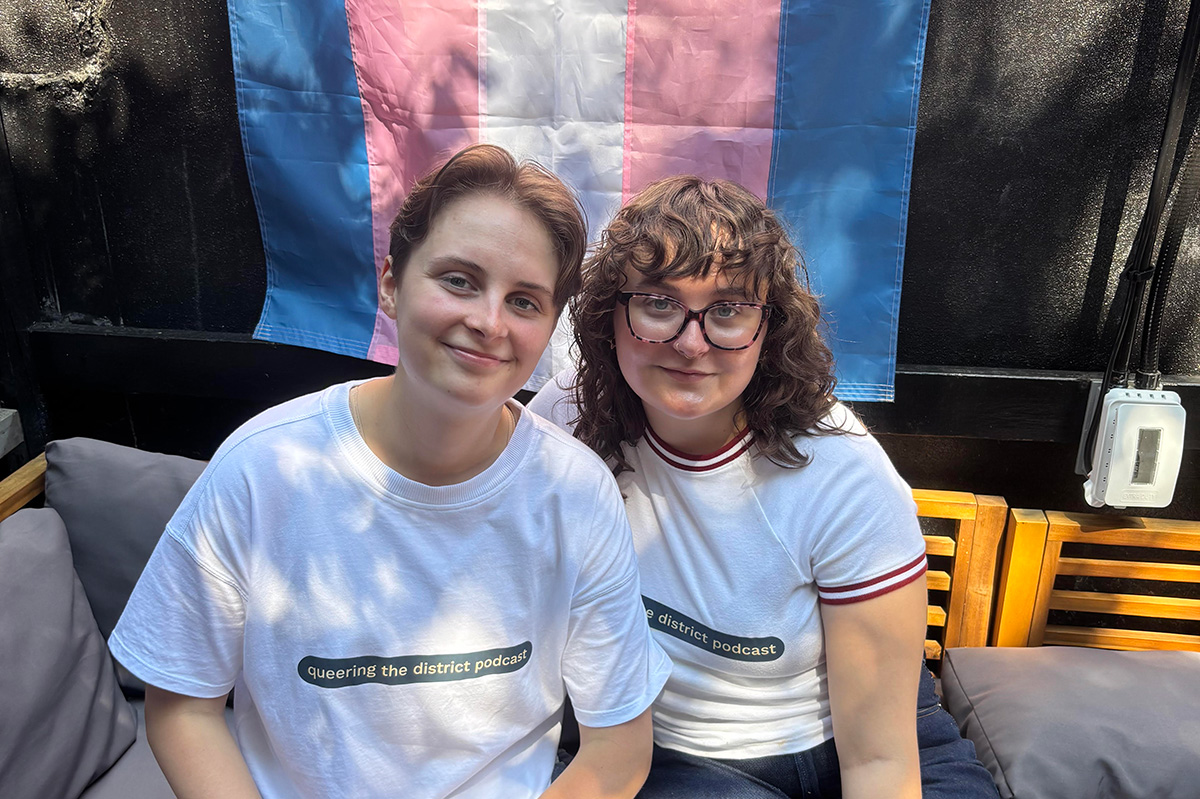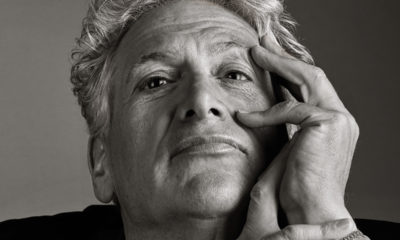Arts & Entertainment
Stage presence
With ‘Laramie,’ ‘Torch’ and ‘Gypsy,’ season rife with gay themes


‘The Laramie Project’ runs through Oct. 27 at Ford’s Theatre, part of a robust fall theater season in Washington. (Photo courtesy Ford’s)
This fall’s local theater offerings are a particularly promising blend of old and new, several of which have LGBT appeal. Here’s an overview.
Fifteen years after Matthew Shepard’s death, Ford’s Theatre (fordstheatre.org) is presenting an anniversary production of gay playwright Moisés Kaufman’s “The Laramie Project” (Sept. 27-Oct. 27). Kaufman’ powerfully affecting ensemble piece gives insight into the community’s response to the 1998 brutal murder of Shepard, a young gay man living in Laramie, Wyo. Matthew Gardiner (who is gay) directs. Local stalwart Holly Twyford (also gay) is in the cast.
Studio Theatre (studiotheatre.org) opens its season with the bittersweet comedy “Torch Song Trilogy” staged by Michael Kahn (Shakespeare Theatre Company’s gay artistic director) and starring the sensational Brandon Uranowitz as Arnold, a caustically funny drag queen who refuses to give up on his longings for love and commitment. Penned by gravelly voiced gay icon Harvey Fierstein (who created the show’s lead character Arnold on Broadway in 1981), “Torch Song” can feel a little dated around the edges, but its central issues of relationships, authenticity and family never go stale. The cast includes local actor Alex Mills, who is gay, as Arnold’s younger love interest.
At Rep Stage (repstage.org) in Columbia, Md., the season opens with Horton Foote’s “A Young Lady of Property” (Sept. 11-29), directed by Michael Stebbins, who’s gay. Set in a small Texas town, it deals with a young woman struggling to hold on to the house that her late mother left her. Following Foote’s sentimental drama is gay playwright Doug Wright’s powerful Pulitzer Prize winning “I am My Own Wife” (Oct. 30-Nov. 17), a compelling solo show about Charlotte von Mahlsdorf, a German transsexual who survives the Nazis and the East German secret police. Stebbins will swap out his director’s hat for an actor’s to play the demanding part of Charlotte.
Olney Theatre Center (olneytheatre.org) is presenting New York’s critically acclaimed BEDLAM Theatre in rotating repertory. Productions include Shakespeare’s “Hamlet” (through Oct. 20) and George Bernard Shaw’s “Saint Joan” (also through Oct. 20). Both directed by Eric Tucker.
After BEDLAM’s take on the classics, Olney’s gay artistic director Jason Loewith is staging Steven Dietz’s “Rancho Mirage” (Sept. 26-Oct. 20), a tale of three seemingly well-adjusted couples who at a dinner party decide to stop fronting and get honest. Dietz is best known for “Lonely Planet,” an intriguing exploration of the AIDS crisis as experienced by two gay men from within the confines of a quiet map shop set in an unnamed big city.
Taffety Punk Theatre Company (taffetypunk.com) presents the Riot Grrrls’ all-woman version of Shakespeare’s “Titus Andronicus” (Sept. 27-Oct. 26), featuring Isabelle Anderson in the title role. Lisa Bruneau directs. In the past, the Riot Grrrls have successfully pulled off testosterone free takes on “Romeo and Juliet,” “Julius Caesar,” and more from the Bard’s canon. It’s the Grrrls’ credo that “a great actress can play a great role, regardless if it’s male or female.”
Longtime Washington favorite director John Vreeke is staging Round House Theatre’s (roundhousetheatre.org) area premiere production of “The Lyons” (Nov. 27-Dec. 22), a savagely funny family comedy by gay playwright Nicky Silver. At Woolly Mammoth (woollymammoth.net), Vreeke (who is gay) is also directing Lisa D’Amour’s “Detroit” (through Oct. 6), a comic takedown of the suburban dream. The cast of local favorites includes Emily Townley, Michael Willis, Gabriela Fernandez-Coffey, Tim Getman and Danny Gavigan.
Arena Stage (arenastage.org) opens its season with Eric Coble’s two-hander “Velocity of Autumn” (through Oct. 20) starring the great Estelle Parsons (“Bonnie and Clyde; she played gay on “Roseanne”) and gay actor Stephen Spinella who created the part of Prior Walter, a gay character with AIDS, in Tony Kushner’s seminal “Angels in America.” An intense 90 minutes, Coble’s play focuses on the relationship of a middle-aged son who returns to his mother’s home after a 20-year estrangement to help her deal with some potentially explosive old age issues.
Exciting things are happening at the National Theatre (thenationaldc.com). The season opens with the world premiere of “If/Then” (Nov. 11-Dec. 8), a romantic musical about a woman on the cusp of middle age, who returns to New York City where she deals with love and the unexpected. It stars Idina Menzel who famously created the part of the green witch Elphaba in Broadway’s “Wicked.”
“If/Then” reunites Menzel with Tom Kitt (music), Brian Yorkey (book and lyrics), and Michael Greif (director), the same creative team behind the Pulitzer Prize- and Tony Award-winning musical “Next to Normal.”
Oscar winning Christine Lahti comes to Signature Theatre (signature-theatre.org) to star in “Pride in the Falls of Autry Mills” (Oct. 15-Dec. 8), young playwright Paul Downs Collaizo’s new play about what lurks behind the pristine façade of a seemingly perfect suburban existence. Michael Kahn directs.
Signature’s gay artistic director Eric Schaeffer is staging Matt Conner’s new musical “Crossing” (Oct. 29-Nov. 24) in which characters from different decades throughout the last century come together and share their experiences in song. Conner, who is gay, is both an actor (he’s performed in many Signature musicals) as well as composer. In the past, Signature produced his musical “Nevermore,” a dreamy tribute to the works of Edgar Allen Poe. In December, Signature is taking a crack at the legendary musical “Gypsy” (opens Dec. 17). Joe Calarco (who is gay) directs and Signature veteran Sherri L. Edelen plays the title character’s indomitable stage mother, Mama Rose.
Synetic Theater (synetic.org) kicks off its season in Crystal City with “The Portrait of Dorian Gray” (Sept. 26-Nov. 3), promising to put its inimitable movement-based stamp on Oscar Wilde’s classic novel. Included in the cast is Helen Hayes Award-winning gay actor Philip Fletcher who plays Gray’s actual portrait. Synetic’s celebrated adaptions are consistently innovative, accomplished and sexy.
Photos
PHOTOS: Independence Day Weekend in Rehoboth
Wicked Green Pool Party, fireworks among festivities

Vacationers and residents alike enjoyed Independence Day Weekend activities in Rehoboth Beach, Del. The Wicked Green Pool Party drew hundreds to the CAMP Rehoboth fundraiser on Saturday. That evening, revelers went to the rooftops to watch the fireworks display.
(Washington Blade photos by Daniel Truitt)













Music & Concerts
Red, White, and Beyoncé: Queen Bey takes Cowboy Carter to D.C. for the Fourth of July
The legendary music icon performed on July 4 and 7 to a nearly sold-out Northwest Stadium.

Just in time for Independence Day, Beyoncé lit up Landover’s Commanders Field (formerly FedEx Field) with fireworks and fiery patriotism, bringing her deeply moving and genre-defying “Cowboy Carter” tour to the Washington, D.C. area.
The tour, which takes the global icon across nine cities in support of her chart-topping and Grammy-winning country album “Cowboy Carter,” landed in Prince George’s County, Maryland, over the Fourth of July weekend. From the moment Beyoncé stepped on stage, it was clear this was more than just a concert — it was a reclamation.
Drawing from classic Americana, sharp political commentary, and a reimagined vision of country music, the show served as a powerful reminder of how Black Americans — especially Black women — have long been overlooked in spaces they helped create. “Cowboy Carter” released in March 2024, is the second act in Beyoncé’s genre-traversing trilogy. With it, she became the first Black woman to win a Grammy for Best Country Album and also took home the coveted Album of the Year.
The record examines the Black American experience through the lens of country music, grappling with the tension between the mythology of the American Dream and the lived realities of those historically excluded from it. That theme comes alive in the show’s opening number, “American Requiem,” where Beyoncé sings:
“Said I wouldn’t saddle up, but
If that ain’t country, tell me, what is?
Plant my bare feet on solid ground for years
They don’t, don’t know how hard I had to fight for this
When I sing my song…”
Throughout the performance, Beyoncé incorporated arresting visuals: Black cowboys on horseback, vintage American iconography, and Fox News clips criticizing her genre shift — all woven together with voiceovers from country legends like Dolly Parton and Willie Nelson. The result was a multimedia masterclass in storytelling and subversion.
The “Cowboy Carter” tour has been a social media sensation for weeks, with fans scrambling for tickets, curating elaborate “cowboy couture” outfits, and tailgating under the summer sun. At Commanders Field, thousands waited in long lines for exclusive merch and even longer ones to enter the stadium — a pilgrimage that, for many, felt more like attending church than a concert.
One group out in full force for the concert was Black queer men — some rocking “denim on denim on denim on denim,” while others opted for more polished Cowboy Couture looks. The celebration of Black identity within Americana was ever-present, making the concert feel like the world’s biggest gay country-western club.
A standout moment of the night was the appearance of Beyoncé’s 13-year-old daughter, Blue Ivy Carter. Commanding the stage with poise and power, she matched the intensity and choreography of her mother and the professional dancers — a remarkable feat for someone her age and a clear sign that the Carter legacy continues to shine.
It’s been nearly two decades since Beyoncé and Destiny’s Child parted ways, and since then, she’s more than lived up to her title as the voice of a generation. With “Cowboy Carter,” she’s not just making music — she’s rewriting history and reclaiming the space Black artists have always deserved in the country canon.
a&e features
From Prohibition to Pride: Queering the District podcast reveals local LGBTQ history
The new podcast explores the hidden history and enduring impact of queer spaces in Washington, D.C.

On June 25, as Pride month inched toward its end, three queer creators launched an ambitious project to honor the spaces that built D.C.’s LGBTQ community—and connect them to today’s queer life. The first episode of their podcast, Queering the District, hit streaming platforms that day, aiming to spotlight what host and co-creator Abby Stuckrath calls “third places”: bars, clubs, and gathering spots that have served as hubs for queer life across the city.
Each episode of the 10-part series delves into a different piece of D.C.’s queer past—from landmark clubs to untold personal stories—told through the voices of drag legends, activists, DJs, historians, and patrons who lived it. The show also threads together personal experiences from today’s community, bringing the listener on an auditory journey from Prohibition-era speakeasies to contemporary nights out at places like As You Are or Saints & Sinners.
Abby Stuckrath, alongside her sibling Ellie Stuckrath, and producer Mads Reagan, make up the podcast’s creative team. A recent journalism graduate of American University, Abby told the Blade that her passion for queer storytelling began during college—and that D.C. itself played a defining role in shaping her queer identity.
“I went to American University. I graduated last year and studied journalism. When I was in school, I always wanted to focus on queer stories – especially in D.C., because I’m from Denver, Colorado, I’ve never lived in a place like this before. D.C. has always just kind of been a place I call home when it comes to my queer identity.”
But breaking into the media to tell those stories wasn’t easy. Stuckrath quickly learned that editorial support—and funding—for queer-focused projects is limited. So she decided to do it her own way.
“I kind of found out that if you want to tell stories, you kind of have to do it on your own– especially when it comes to queer stories. There’s not a lot of people begging for us to talk about queer people and to pay you for it. So I was like, ‘Okay, let’s just do it on my own.’”
The idea for the podcast first took root in conversations with Ellie, Abby’s sibling and biggest supporter. Ellie had also moved to D.C. to find more space to explore and express their queer and gender identities. Together, the two began shaping a vision that would combine storytelling, sound design, and grassroots community input.
“I was like, ‘I don’t know what exactly I want to do yet, but I want it to be queer, and I want it to be about D.C., and it’s going to be called Queering the District, and we’re going to find out what that means.’ And Ellie is my biggest supporter, and my best friend. And they were like, ‘Hell yeah. Like, let’s do this.’ And so we decided to just do it together.”
The name stuck—and so did the mission. The team began researching queer D.C. history and found a city overflowing with stories that had rarely been documented, especially in mainstream archives.
“We started looking up the history of queer culture in D.C., and it kind of just clicked from there,” Stuckrath said. “I did not know anything about how rich our history is in the city until one Google search, and then I just kept learning more and more. I was kind of pissed because I studied gender studies in school in D.C. and didn’t learn shit about this.”
Season one focuses on the role of third places—non-work, non-home spaces where queer people could gather, exist fully, and build community.
“Third places have always been the epicenter of queer life… places outside of just your own personal home, because sometimes that isn’t a safe place. And of course, the work most commonly in the past and still today, isn’t a safe place for queer people to be full of themselves. So like, bars were the first place for queer people to really thrive and meet each other.”
To make the show participatory, Queering the District includes a twist: a voicemail line where anyone can call in and share a memory or question. The team calls the phone “Fifi”—a nod to the kind of retro guestbooks often used at weddings, but reimagined for queer nightlife and history.
“We wanted to find a way for people to share their stories with us anonymously… so even though we start in Prohibition, we wanted to connect it to now—like, those people who were singing jazz to each other in a white queer bar are connected to you singing karaoke on a Sunday night at your favorite gay bar. We’re all interconnected by this third place of queer bars in D.C.”
Those connections are emotional as well as historical. While building the series, one realization hit Stuckrath particularly hard: the immense loss of queer spaces in D.C., especially in neighborhoods that have since been heavily redeveloped.
“Every time I go to a Nats game, I think about, well, this just replaced five gay bars that used to be here. It used to be the home of Ziegfeld’s… Tracks, which was almost 2,000 square feet, with a volleyball court in the back, a fire pit, and iconic light show. I just didn’t know that we had that, and it made me sad for the queer elders that are in our city now who walk the streets and don’t see all those places they used to call home.”
That sense of loss—alongside the joy and resilience of queer community—is what the show aims to capture. As the podcast continues, Abby hopes it serves as both a celebration and an educational tool, especially for young LGBTQ people arriving in D.C. without realizing the queer foundations they’re walking on.
“D.C. is a unique city, and specifically young queer people who are hoping to move to the city—to know that you’ve got to know your history to be here. I hope this serves as an easier way for you to consume and learn about queer history, because queer history defines how we move in life.”
And for all the voices still left out, Abby is clear: this podcast is an open door, not a final word.
“This is a perfectly imperfect podcast. We should just be a starting point. We shouldn’t be the ending point.”
New episodes of Queering the District drop every Wednesday on all major platforms.




















